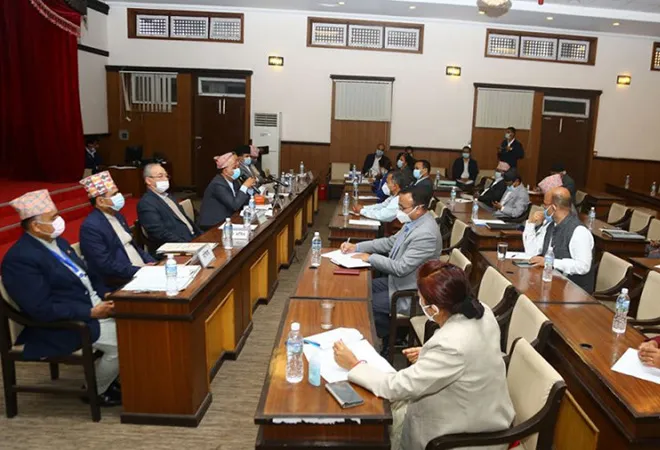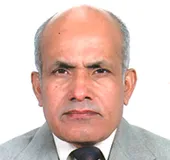
Amidst the Covid-19 crisis that has taken the toll to the life of 32 persons and infected over 15,000 people as of July 3, 2020, a chain of political events have been taking place in Nepal and the latest in the series is the controversial bill on Citizenship Act 2063 brought about by the Secretariat of ruling Nepal Communist Party (NCP) headed by K.P. Sharma Oli. This bill was easily endorsed by the lawmakers of the Parliamentary State Affairs and Good Governance Committee as 16 out of 27 of its members belonged to the NCP. Likely, the bill will be presented to the full house of the parliament for further discussion and endorsement. Since the NCP has close to a two-thirds majority in the parliament, it will not be difficult to pass the bill.
The citizenship issue is most sensitive in Nepal. In its absence, one cannot enter into government jobs, participate in electoral politics, buy or sell the property and even get entry into the academic institutions. Unfortunately, hundreds of thousands of people in Nepal are such who have not been granted citizenship certificates so far and the victims are mostly from the Madheshi community, the poor and downtrodden sections of the population. Such people are deprived of all the rights and privileges of the nation. In the past, several commissions were constituted to resolve the citizenship issue, but it is not yet settled.
Nepal’s Interim Constitution 2006 (2063) allows the foreign women married to Nepalese men to acquire naturalized citizenship of this country. Such women enjoy all the rights as made available to the Nepalese citizens except the constitutional posts like the Prime Minister, President, Chief Minister, etc. But now the amendment bill has made it mandatory for the foreign women married to Nepalese men to wait for seven long years to acquire naturalized citizenship.
Civil society, apart from the NGOs, political and social activists find the citizenship bill gender discriminatory and regressive. This is because there is one law for the men and another for the women. As per the amendment bill, the foreign women married to the Nepalese men would have to wait for seven long years to acquire the naturalized citizenship certificate; while the foreign men married to the Nepalese women are eligible for naturalized citizenship only after they reside in Nepal continuously for 15 years.
Sometimes it is argued that in India, too, there is a provision whereby foreigners married to Indians have to reside in India permanently for seven years to become eligible for Indian citizenship. But it is forgotten that such a rule is applicable both for the men or women unlike in Nepal where the citizenship rule for the Nepalese men married to foreign women is different from those of the Nepalese women married to foreign men.
It is also to be noted that there is no citizenship certificate issued to the Indian citizens as in Nepal. What the Indian citizens get are ration cards, voter cards, Aadhar Cards, etc., which symbolize their Indian nationality. However, the Aadhar Cards are not citizenship cards in a true sense as it is merely a residential certificate given both to the Indian citizens and foreign nationals.
As per the 1950 Treaty of Peace and Friendship between Nepal and India, the Nepalese nationals are accorded national treatment in India whereby the Nepalese women married to Indian men are easily given all such political, economic and social rights, including the voting rights, as granted to the Indian citizens. Speaking on this issue at the Indian Parliament on December 11, 2019, India’s Home Minister Amit Shah clearly said, “So far as Nepalis are concerned, Nepal and India have agreed to grant, on a reciprocal basis, to the nationals of one country in the territories of the other the same privileges in the matter of residence, ownership, ownership of property, participation in trade and commerce, movement and other privileges of a similar nature as per Article 7 of the Peace and Friendship Treaty reached on July 31, 1950.” In context to the Nepalese in India, he added, “Nepali nationals are getting citizenship certificates easily even today based on a simple application. There are no obstructions to this.”
As per the citizenship amendment bill, foreign women married to Nepalese men could run business and make earning, use and sell fixed and movable assets, engage in industrial, business and trade activities until they acquire citizenship rights. Also, they might register vital events related to birth, death, marriage, divorce and migration. They might also be admitted to academic institutions. Also, they could enjoy economic, social and cultural rights.
But it is not sure as to what will happen to the fate of those foreign women married to Nepalese men if they become widows before they acquire naturalized citizenship of this country. Such women could find it increasingly difficult to get the share in the property of their husbands, apart from enjoying other economic and social rights.
Foreign women married to the Nepalese men will get some kind of identity card before they acquire naturalized citizenship, but the fact is that in Nepal no identity card is the substitute for a citizenship certificate. And, more than that the present Nepalese constitution does not have any provision to issue an identity card to such women.
If the citizenship bill is passed, the foreign women married to Nepalese men will neither be able to acquire Nepalese passports nor will they apply for government jobs until they acquire naturalized citizenship certificate after seven years. They will also be debarred from enjoying political rights like casting votes or contesting elections.
The new citizenship bill would largely affect ‘roti-beti’ (bread and bride) relations between Nepal and India. Such a practice is common especially among the border inhabitants who often enter into cross-border marriages mainly on account of the open-border system between the two countries. For centuries, the marriage relations among the border inhabitants of the two countries continue to serve as a strong bridge of friendship between the two countries.
Because the citizenship bill brought about by the ruling NCP has created fear psychosis, especially among the Maddheshi community, this step of the NCP is opposed by the major opposition political parties, including the Nepali Congress (NC) and the Janata Samajbadi Party Nepal (JSPN).
Jitendra Dev, Former Minister and now MP of Nepali Congress in the National Assembly strongly criticized the citizenship bill for it is intended to end the ages-old cultural relations between Nepal and India. He also said that the bill would neither promote democracy nor federalism, but it might invite political accident.
Even former Minister Ajay Shankar Nayak of the ruling NCP said that the citizenship bill brought about by the Secretariat of CPN has created a lot of confusion in the country for it would not only widen the differences among the political parties, but it might even invite disaster.
Because of the flaws in the citizenship amendment bill, protests against the bill have started in Kathmandu and different corners of the Terai region, including in Birgunj, Rajbiraj, Jaleshwar, and Janakpur. The protesters have been making the demand for the withdrawal of the citizenship bill.
The citizenship bill, if passed by the Nepalese parliament, will further complicate the citizenship issue in the country. It will directly hurt the emotions and sentiments of the people, apart from affecting the traditional bonds of cultural and social relations between the two countries. Possibly, this could reshape the entire gamut of relations between the two countries, which does not seem to be in the interest of either of these countries. Therefore, the need of the hour is that certain groups of people who want to create a thaw in relations between the two countries should rise above the petty interests and help withdraw the citizenship amendment bill. The sooner it is done, the better it would be in restoring peace, prosperity and amicable in relations between the two countries.
The views expressed above belong to the author(s). ORF research and analyses now available on Telegram! Click here to access our curated content — blogs, longforms and interviews.




 PREV
PREV


